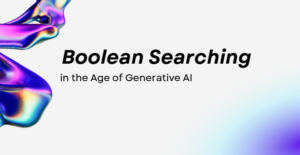
In the ever-evolving landscape of recruitment, technology continues to reshape how talent acquisition professionals identify and engage with candidates. Among these advancements, the rise of Artificial Intelligence (AI) and automation tools has profoundly impacted a cornerstone of recruiting: Boolean search strings. As AI grows more sophisticated, a critical question arises—are Boolean search strings becoming obsolete, or can they coexist and even integrate with AI-driven prompts?
My book, AI Talent Sourcing, delves into this transformative shift, exploring how advanced AI prompts can be used not only to enhance natural language searches but also to generate and refine Boolean search strings. By blending traditional methods with cutting-edge AI tools, recruiters can unlock new levels of efficiency and precision in their sourcing strategies.
Boolean Search Strings: A Foundation of Recruitment
For decades, recruiters have relied on Boolean search strings to navigate large databases and identify the right candidates. With carefully crafted queries using operators like AND, OR, NOT, and parentheses, recruiters have been able to extract targeted results from applicant tracking systems (ATS) and professional platforms like LinkedIn.
Despite their utility, Boolean searches have limitations. They require a precise understanding of syntax, can become unwieldy with complex queries, and often produce results limited to the exact terms entered, potentially overlooking relevant candidates with alternative skill descriptions.
Enter AI Prompts: Revolutionizing Search
AI-driven tools have begun to reshape how recruiters conduct candidate searches. By leveraging natural language processing (NLP) and machine learning, AI can interpret broader, more conversational prompts. For example, instead of crafting a Boolean string, a recruiter might input, “Find software engineers with experience in Python and machine learning who have worked in fintech.” The AI then interprets the intent and delivers refined results, often including candidates who might have been missed using traditional methods.
Advantages of AI Prompts:
- Ease of Use: No need for mastery of Boolean logic.
- Contextual Understanding: AI recognizes synonyms, related skills, and variations in job titles.
- Enhanced Efficiency: Faster, more intuitive searches save time.
- Dynamic Learning: AI improves over time, learning from user behavior and refining its results.
The Future: Coexistence or Replacement?
While AI prompts bring undeniable advantages, Boolean search strings are unlikely to disappear entirely. Instead, the future likely lies in a hybrid approach:
- Enhanced Boolean Queries: AI tools could assist in constructing more effective Boolean strings by suggesting terms or correcting syntax errors.
- Layered Searches: Recruiters might use Boolean searches for initial broad filtering and AI for deeper, context-driven insights.
- AI-Powered Boolean: Some systems may integrate AI’s understanding of language directly into Boolean operators, creating a seamless blend of both approaches.
Preparing for the Shift
To stay ahead, recruiters should:
- Embrace AI Tools: Familiarize themselves with emerging platforms and their capabilities.
- Refine Boolean Skills: A strong foundation in Boolean logic can complement AI tools and enhance search strategies.
- Invest in Training: Continuous learning in AI, NLP, and recruitment technologies will be essential.
- Focus on Strategy: As technology handles more tactical tasks, recruiters can focus on strategic, relationship-driven aspects of hiring.
Conclusion
The future of recruitment is undoubtedly intertwined with AI and automation. While Boolean search strings have served as a cornerstone of talent acquisition, AI prompts represent the next evolution, offering enhanced accuracy and efficiency. By embracing both, recruiters can ensure they remain at the forefront of innovation, navigating the talent landscape with precision and adaptability.
Want to stay up to date? >> I recommend reading my book: AI Talent Sourcing
In an era where artificial intelligence is revolutionizing the recruitment landscape, this book offers invaluable insights into integrating AI into talent acquisition strategies. Written by Jonathan Kidder and GPT-4, the book serves as a practical guide for HR professionals, recruiters, and talent sourcers eager to harness the power of AI to streamline their processes.
This book provides:
- Comprehensive AI Insights: It explains the capabilities of tools like ChatGPT-4 and relevant plugins, enabling readers to navigate the evolving AI ecosystem effectively.
- 500+ AI Prompts for Recruitment: A curated collection of prompts tailored specifically for sourcing and recruitment tasks, making it easier to automate and optimize candidate searches.
- Creative Prompt Development: Encouragement and strategies to craft unique questions for AI, helping recruiters think outside the box and adapt to varied sourcing challenges.
This resource empowers professionals to enhance productivity, reduce time spent on manual tasks, and embrace the innovative possibilities AI offers in sourcing talent. Whether you’re an experienced recruiter or a talent acquisition specialist exploring AI tools, this book equips you with the knowledge and practical tools to stay ahead in the AI-driven recruitment age.
[You can buy the book here]
Recommended Reading:
Becoming an Effective Recruiting Leader: Tips for Managing a Team
Top 10+ AI Recruiting Software Tools to Transform Hiring in 2025
Talent Sourcing in 2025: Predictions for a Dynamic Workforce
- AI Search Will Transform Talent Sourcing Forever - January 10, 2025
- Build an AI Sourcing Assistant using ChatGPT 4 - January 10, 2025
- Top Recruiting Leaders to Follow in 2025 - January 8, 2025

Spot on Jonathan. I think we need a data focused approach to sourcing on platforms. What data is on the profile of a candidate on a platform like LinkedIn for example and how is that data organized and how does the platform categorize and recall it. LinkedIn is moving towards filter and ML first categorization so I think it’s smart to embrace ai prompts and always try booleans on the next pass.